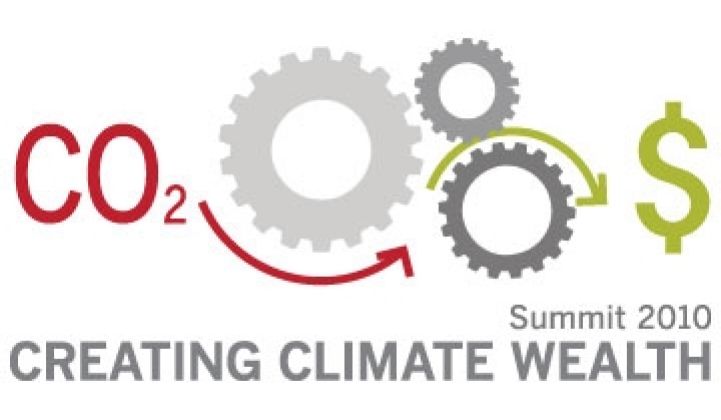Washington D.C.--Half of my professional life I spend hanging out at conferences, and at least half of that time, I spend hanging out by the coffee urn glad-handing as many people as I can.
It beats sitting through a slideshow of yet another set of 2012 revenue predictions, for one thing, and it's a great way to get tips. Here are selections from some of the hallway chatter at the Creating Climate Wealth conference that took place this week in Washington, D.C. We will be following up on some of these leads, but this overview will give you an idea of what's on the minds of at least some of the investors and policymakers who are here.
--Hedge fund manager Michel Delafontaine told me of a project going on at a couple of U.S. national labs to convert carbon dioxide into liquid fuel with hot iron. A rotating disk of iron oxide is heated to around 1500 degrees Celsius on one side. The heat strips the iron of the oxygen atoms. The other side of the disk is heated to around 700 Celsius and is bathed in carbon dioxide. When the clean iron arrives in this new environment, it strips oxygen from the carbon dioxide and converts that second substance into carbon monoxide. The CO can then be burned as a synthetic gas or converted into a liquid fuel. This process is still in the experimental stage, but it is definitely interesting. Delafontaine said he is also intrigued about the possibilities of using ammonia for energy storage.
--MaxWest Environmental Systems wants to be number one in number two, said Ricardo Nogueira, a partner at EEA North America, another hedge fund. MaxWest has created a system that takes solid waste streams from sewer systems and converts the biosolids into a synthetic gas through an intense drying process. The gas is then burned at the site to provide energy at the drying system. Overall, MaxWest, an EEA portfolio company, can help reduce the onerous acreage needed for waste remediation. It is highly recommend that they license "Circle of Poo" from South Park. (Side note: we picked sewage as a growth market last year.)
--Renewable energy education, i.e., teaching people how to install solar panels, smart grid equipment or service electric cars, could become a growth market. I ran into two separate people with startups that aim to be something like the University of Phoenix for renewables. The Department of Energy recently issued $100 million in grants for smart grid maintenance and installation education. One of the companies, Futurlogic, is run by Jonathan Cropper, who once worked at Nissan.
--The water situation is dire indeed in Australia, said Doug Miell, a water resource management consultant. The rice crop in the country has dropped from 1.1 million tons to 17,000 tons.
--Sungevity is part of a group that went to the White House on Earth Day to encourage the Obamas to get solar on the White House. Former (as in no more, forever) President Bush put solar on a maintenance shed, but the organization wants to see a full complement of panels installed. One of the complaints the solar industry still hears is how solar must not work because the panels put up by Jimmy Carter were removed, said Sungevity president Danny Kennedy. Reagan actually just had them removed due to personal preference.
--Namibia could become a growth market. The African nation gets the majority of its power from South Africa. South Africa, however, has told Namibia to expect a massive hike in its utility bills. Namibia thus is now scouring for energy efficiency technology, one executive with a Namibia project in the pipeline told me.
--As expected, cars in car-sharing fleets get beat up pretty bad. That observation came to me from Will Maus, who used to run such a service in Philadelphia. The cars went out an average of six times in a single day. It's an interesting factoid to think about when contemplating the growth of these services.
--Attendees overall agreed that Jose Maria Figueres, the former president of Costa Rica and the CEO of the World Economic Forum, is one of the more engaging speakers to hit the greentech circuit in quite some time. We had a video interview lined up, but he had to catch a plane -- we'll catch him next time.



